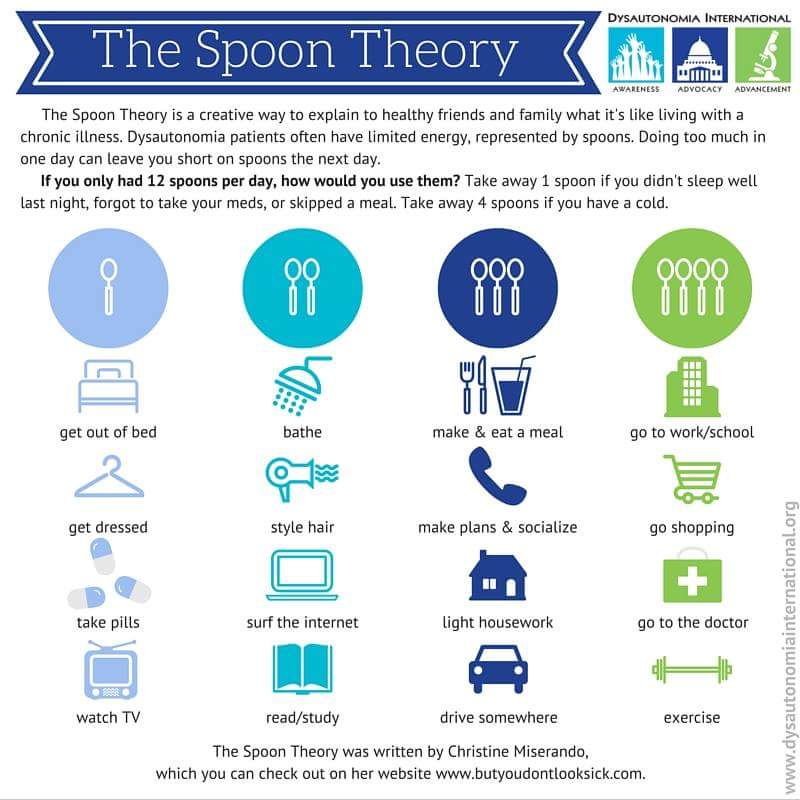
One thing I like to teach business owners about is The Spoon Theory. While the theory was created for those with chronic illnesses, I believe this can also work for neurodivergent folx. After all, anxiety can suck the life out of any day!
TL:DR – Each daily activity costs a certain number of spoons and you start each day with a certain number of spoons, so once you spend all of your spoons…that’s it. You begin to borrow from tomorrow and the next day and the next and the next and…you get the point. It’s a simple, yet powerful metaphor that can help you understand what it’s like to live with a chronic condition.
What is the Spoon Theory?
The Spoon Theory was created by Christine Miserandino, a woman living with lupus. One day, over a casual dinner with a friend, she found herself trying to explain what it feels like to live with a chronic illness. Struggling to find the right words, she grabbed a bunch of spoons from the table and handed them to her friend. Each spoon represented a unit of energy or a resource for the day. She then walked her friend through a typical day, showing how each activity, no matter how small, required a spoon.
Like, how amazing is it to come up with something so wonderful and helpful on the fly?
The Spoon Count
Alright, let’s go over how to visualize this.
Let’s start with the morning. You wake up, but you’re already tired because chronic illness doesn’t care about how much you’ve slept. Getting out of bed and showering? There goes a spoon. Making breakfast? Another spoon. By the time you’ve dressed and had something to eat, you might be down a few spoons, and the day has just begun.
Now, imagine you have a job. Getting to work, sitting through meetings, and focusing on tasks can drain several spoons. By lunchtime, you’re running low. You still have half the day to go, but you’re already worrying about conserving your remaining spoons for essential activities. Do you socialize with colleagues, or do you save that energy for grocery shopping after work? Choices, choices.

The Art of Rationing Spoons
Living with a chronic illness or neurodivergency means constantly having to ration your spoons. You become a master planner, always weighing the importance of tasks. Do you go out with friends tonight, knowing it might mean you’re too exhausted to function tomorrow? Or do you stay in, conserving energy for the rest of the week? It’s a delicate balance, a constant juggle of priorities and limitations.
The Emotional Toll
The Spoon Theory also highlights the emotional and mental toll of chronic illness. It’s not just about physical exhaustion. Making decisions based on spoon availability can be frustrating and isolating. Imagine having to explain to friends why you’re canceling plans again. Or feeling guilty because you’re missing out on family activities. The Spoon Theory helps others understand that it’s not about not wanting to participate; it’s about simply not having the resources to do so.
Spoon Theory and Empathy
One of the most beautiful aspects of the Spoon Theory is its ability to foster empathy. When you explain your daily struggles using spoons, it becomes easier for others to visualize and understand.
They might finally understand that your energy isn’t limitless and that simple tasks can have a significant impact on your day.
This understanding can lead to more support, patience, and kindness from those around you.
Living As A “Spoony”
For those living as a Spoony, the Spoon Theory isn’t just a metaphor; it’s a survival guide. It helps in planning the day, making informed choices, and communicating needs to others. It’s a reminder to be gentle with oneself and to recognize the limits imposed by the illness.
It also encourages finding joy in small victories and appreciating the moments when you do have a few extra spoons to spend on something you love.
How It Can Change Lives
So the next time someone mentions they’re running low on spoons, you’ll know they’re not just talking about cutlery—they’re sharing a glimpse into their world, one that requires strength, resilience, and a whole lot of spoon management.
At Hello Hustle, we believe empathy is the cornerstone to existence, so here’s hoping you learned a bit more about those around you. Know someone who will benefit from this knowledge? Make sure to share!